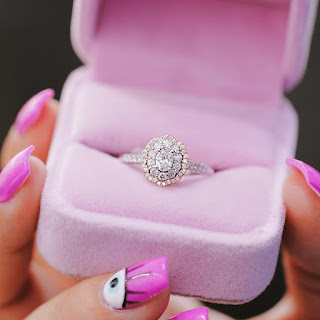Why Lab-Grown Diamond Fashion Jewelry is the Future of Sustainable Style?
I still
remember the first time I saw a lab-grown diamond ring up close. A friend
showed it to me at brunch one lazy Sunday, while we sipped iced lattes and
gossiped about work and life. “Guess how much this cost,” she said, wiggling
her fingers with a grin. The stone was sparkling like any high-end diamond I’d
ever seen. When she told me it was lab-grown and almost half the price, I
nearly spilled my coffee. That’s when I knew something big was shifting in the
jewelry world.
We’ve all
seen the way fashion and lifestyle choices are changing lately. From tote bags
that replace plastic to bamboo toothbrushes lined up neatly on our bathroom
shelves, there’s a quiet revolution happening in how we shop. And jewelry—once
the domain of heavy mining and hush-hush sourcing—is finally joining the
movement. Enter lab-grown diamond fashion jewelry. It’s not just a trend or a
fleeting idea on some influencer’s grid. It’s here to stay, and honestly, it
makes sense.
What
Exactly Are Lab-Grown Diamonds?
If you’re
picturing some cheap crystal knock-off, it’s time to clear that up. Lab-grown
diamonds are real diamonds. They’re created using advanced technology that
replicates the earth’s natural diamond-forming process, just in a controlled
lab environment. That means they’re chemically, physically, and optically
identical to mined diamonds. They’re not “fake diamonds” or cubic
zirconia—they’re simply diamonds with a different origin story.
And
personally, I think that origin story is pretty cool. Imagine a diamond that
didn’t have to be dug out of the earth with questionable labor practices or
environmental impact. Instead, it was created with human ingenuity and
care—like the difference between buying a factory-farmed egg and one from your
aunt’s backyard chickens.
Why
Is Lab-Grown Diamond Jewelry Gaining Popularity?
In recent
years, lab-grown diamond sales have soared. Scroll through Instagram or peek at
jewelry counters in trendy stores, and you’ll spot lab-grown diamond necklaces,
fashion rings, hoop earrings, and even elaborate cocktail pieces that would
make any vintage-loving soul pause.
One big
reason is affordability. You can often get a larger, higher-quality lab-grown
diamond for the same price as a smaller mined diamond. For someone shopping for
fashion jewelry—those fun pieces we wear to dinner parties, weddings, and
random Tuesday coffee dates just because—it feels amazing to get something
substantial without wiping out your savings account.
Another
reason is simple: people care about where their purchases come from now. Just
like my friend who asked me last week if she should buy a recycled gold chain
instead of a mined one, consumers are leaning into ethical choices that still
feel luxurious. Lab-grown diamonds tick that box.
Sustainability:
The Heart of This Shift
We all
know diamond mining has a dark side. Environmental destruction, displaced
communities, unsafe working conditions—it’s not pretty. When you choose
lab-grown diamond fashion jewelry, you’re making a small but powerful decision
to step away from that narrative. There’s no mining involved. No massive holes
in the earth. No murky supply chains. The carbon footprint is drastically
lower, and for many, that feels like a breath of fresh air in a world
suffocating with fast fashion waste and exploitation.
It’s a bit
like choosing to thrift your denim jacket instead of buying a brand-new one
from a brand notorious for polluting rivers. Small decisions, yes, but imagine
if everyone made them. That’s how real change happens.
Style
and Affordability without Compromise
Let’s be
honest. We all love a good deal, but no one wants to sacrifice style or
quality. The beautiful part about lab-grown diamond fashion jewelry is that you
don’t have to. Designers are getting bold with their creations—from delicate
diamond chokers that sit perfectly above your collarbone to chunky statement
rings that command attention in the boardroom.
Because
lab-grown diamonds cost less to produce, brands can pass that savings on to
shoppers or design larger, more artistic pieces without inflating prices. For
example, that dreamy floral diamond cuff you’ve been eyeing feels far more
attainable when it’s lab-grown.
I’ve even
seen lab-grown diamond ear climbers styled with a simple white tee and jeans.
They add just the right sparkle to a casual outfit, making you feel pulled
together without screaming, “Look at me, I spent thousands.”
Aligning
With Modern Values
These
days, style isn’t just about looking good. It’s about feeling good, too. People
want to know their jewelry aligns with who they are. Whether you’re a bride
looking for an engagement ring that reflects your eco-conscious mindset or
someone who simply wants to treat themselves to a guilt-free pendant, lab-grown
diamonds fit seamlessly into that story.
There’s an
emotional satisfaction in knowing that what you’re wearing doesn’t harm the
planet or people. It feels like wearing your values on your sleeve—or around
your neck or on your finger—and that’s powerful.
What
Does the Future Hold?
The future
of fashion jewelry is bright, quite literally. As technology improves, lab-grown diamonds
are becoming more innovative in cuts, colors, and customization options. Brands
are getting creative, combining them with recycled metals and artisanal designs
that tell a richer story.
I wouldn’t
be surprised if, in a few years, synthetic diamonds become the default choice for
fashion jewelry. Their affordability, ethical background, and versatility make
them the perfect candidate to dominate jewelry collections across the world.
Wrapping
It Up
So, next
time you’re scrolling through jewelry online or wandering past a boutique
window, pause for a moment if you see “lab-grown diamond”
in the description. Know that you’re looking at the future—a future where style
doesn’t cost the earth, where luxury feels approachable, and where you can
sparkle with a clear conscience.
Because
honestly, what’s better than jewelry that not only makes you look good but
makes you feel
good too?


Comments
Post a Comment